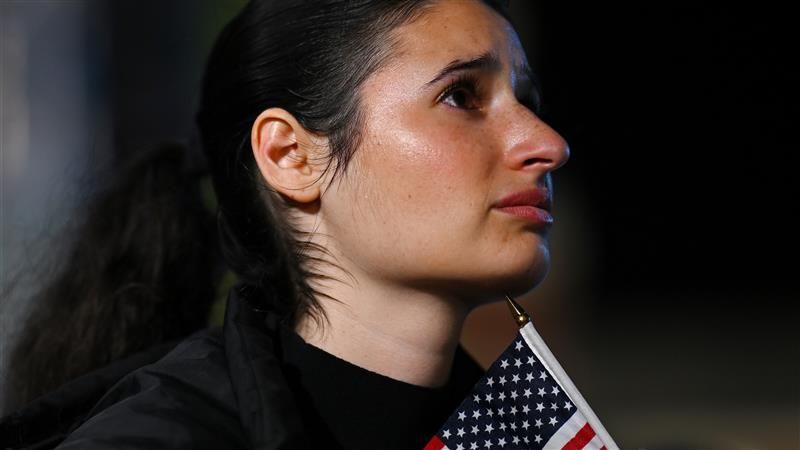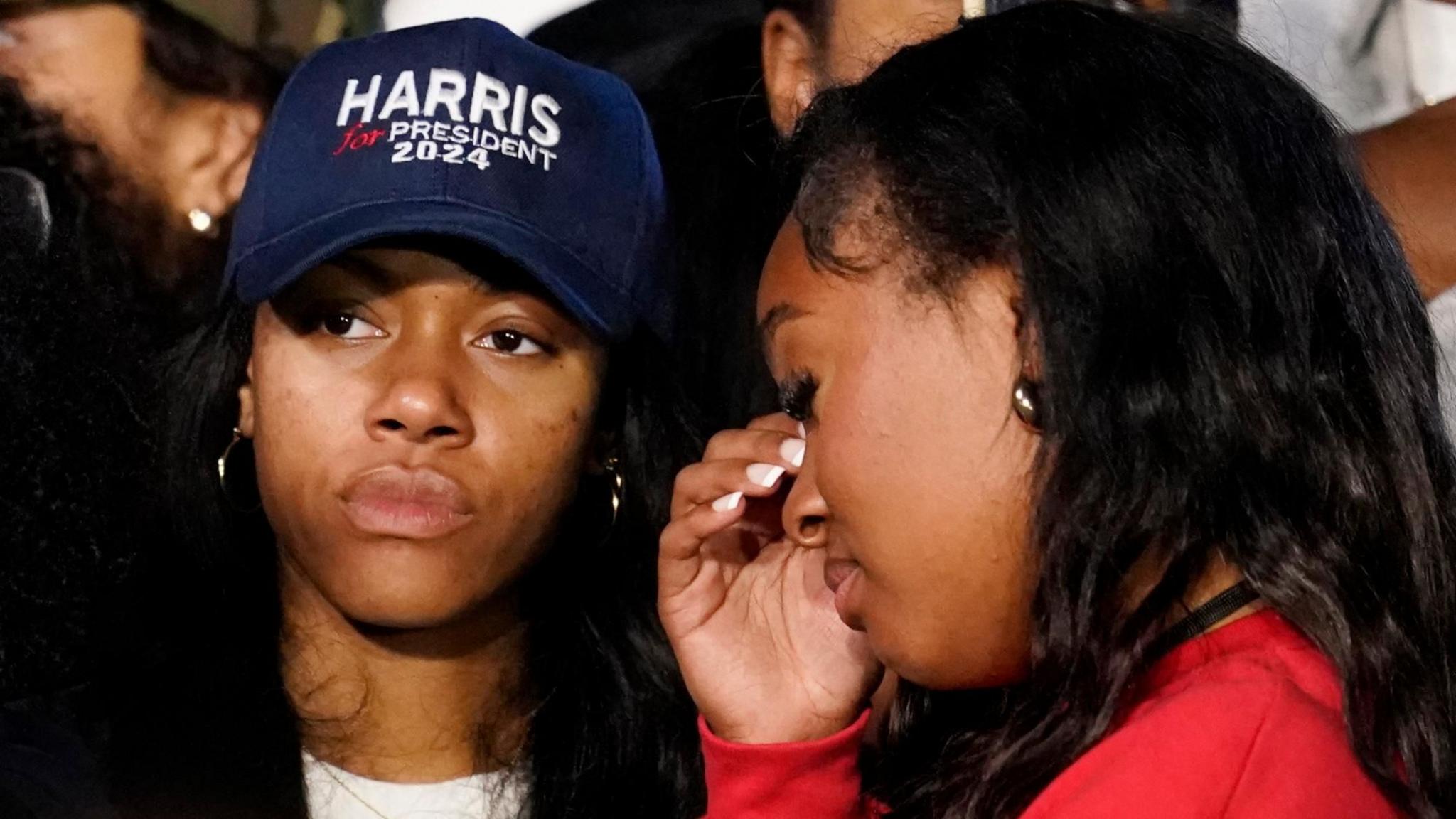Mood falls flat at Harris party as Democrats' hopes slip away

A Harris supporter watches results come in during an election night watch party at Howard University
- Published
Just after midnight, a few hundred feet from where Kamala Harris was expected to stand on stage for her election night party at Howard University in Washington, DC, a handful of students sat in a huddle.
They began their night ecstatic, they said, ready to celebrate the ascent of a Howard alum to the highest office in the US.
The Democratic presidential nominee had chosen to return to her alma mater to mark the occasion, but later cancelled the planned appearance as the mood soured and Trump's victory began to look all but certain.
“I felt so excited, like this is history in the making,” reflected Cori Ross, 20. “No other campus has the future president, or at least the current vice-president on their grounds.”
When the country’s first two swing states - Georgia and North Carolina - were both projected for Donald Trump, the collective change in mood was obvious.
“We’re freaking out,” said Ross’s fellow student Dru Strand during the "super stressful" experience of watching the results arrive.
The crowd packed inside Howard’s Yard, the grassy quad at the centre of the university, started to thin out, seemingly hundreds of people streaming off campus in the cool autumn evening.
Those who stayed seemed to grasp at the enthusiasm of hours before, dancing and singing along to the music by Usher, Kendrick Lamar and Beyoncé, blasting from the speakers dotting the yard.
BBC correspondent reports from near-empty Harris event
Only hours earlier on Tuesday, the mood across Howard’s campus had been exuberant, reminiscent of the joy and enthusiasm that characterised the early days of Harris’s presidential campaign.
Thousands stood outside under the night sky, ready to celebrate the country’s first woman president.
Unlike Hillary Clinton, who made gender a centrepiece of her 2016 run, Harris mostly sidestepped discussions of identity, and the history-making potential of her campaign.
And yet, the choice of venue on Tuesday night was replete with symbolism, bringing Harris’s campaign to a close at Howard, one of the country’s preeminent historically black colleges and universities (HBCU).
Many in the crowd were decked out in Howard merchandise, or the regalia of Harris’s sorority Alpha Kappa Alpha (AKA), the country’s first black sorority, the sorority’s trademark bright pink colour standing out in the sea of people.
“It means a lot that she decided to come home,” said Patrice Williams, a member of AKA who attended another one of the country’s HBCUs.
After months of polling showing the candidates in a virtual tie, early voting data gave the Harris team some reason for optimism: women - who polls show are backing Harris by a sizable margin - were turning out in record numbers.
And when early returns showed Harris boasted modest leads in crucial states Pennsylvania and Michigan, the gathered crowd erupted in excitement, believing the night was tipping in her favour.
But that cautious excitement soon gave way to anxiety, as Harris’s path to the White House looked increasingly improbable, blocked by Trump’s accumulating state victories.

Supporters react during the Election Night rally for U.S. Democratic presidential nominee Kamala Harris
“It’s extremely nerve-wracking,” Ross said. “I feel that people don’t comprehend what truly is on the line. So much could switch by the end of the week, we could be living in a completely different nation.”
Others spoke of their fear over another contested election, worries that violence would erupt no matter the outcome.
Howard student and Harris supporter Kimathi Talton, 20, called it a "lose-lose".
"If Trump wins, that's obviously bad. But even if Kamala wins - God willing - I don't doubt that Trump supporters will respond with violence," he said. "I'm very afraid of any outcome."
By the time Pennsylvania - perhaps the most crucial of all swing states - was projected for Trump, Howard's campus had all but cleared out. Large projection screens beamed down a bright blue Harris-Walz sign at a mostly deserted campus.
Kabila Magnum, 31, was one of the few supporters left.
Magnum, who wore pink eye makeup to mark her own AKA membership, felt the mood change in real time, a sudden deflation in the crowd around her.
“The energy went down,” she said. But she retained some stubborn optimism: there were still votes left to be counted.
“We’re not finished. It’s not over until it’s done,” she said.

SIMPLE GUIDE: How to win the electoral college
RESULTS: When will we know who has won?
EXPLAINER: What Harris or Trump would do in power
BBC COVERAGE: How to follow the US election on the BBC
